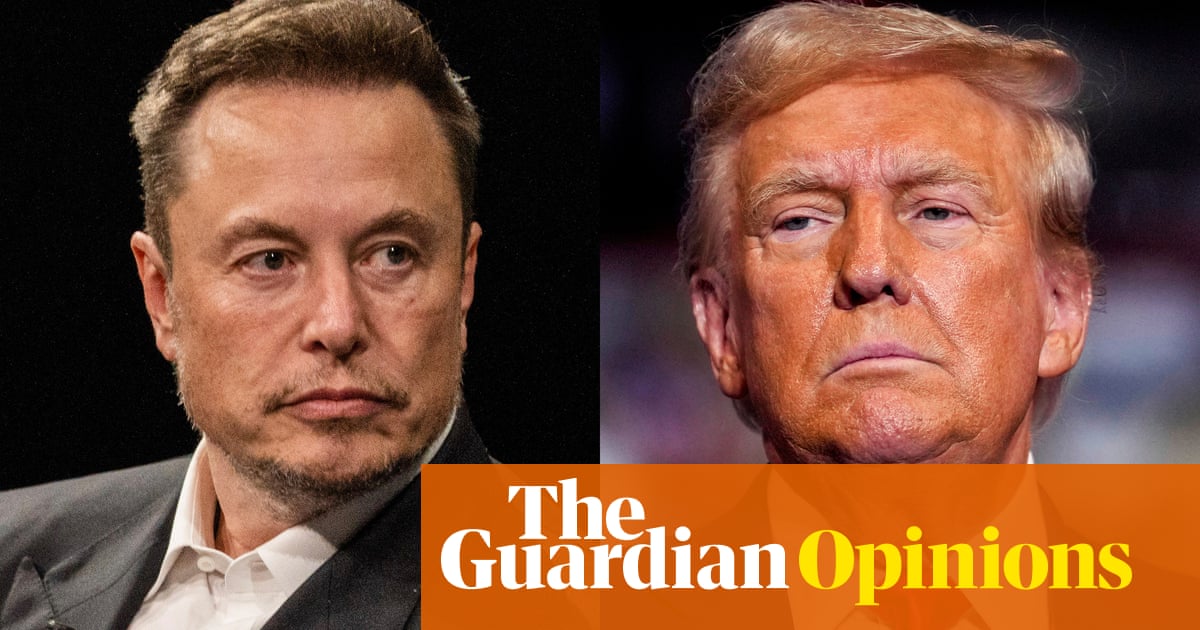What if Elon Musk went to Washington to serve in Donald Trump’s White House? There have been worse pitches for a comedy sketch, I suppose. Veep’s Armando Iannucci could probably do something with it. Sadly, the notion is all too real. Sort of.
A Reuters reporter recently asked Trump whether he’d consider appointing Musk to his cabinet. “He’s a very smart guy,” Trump responded. “I certainly would, if he would do it, I certainly would. He’s a brilliant guy.” Musk replied with an AI-generated rendering of himself alongside a decade-old crypto meme and tweeted, “I am willing to serve.” It’s not the first time the idea has come up – Trump floated the possibility in May – but it is the first time that Musk has responded in the affirmative, winkingly or otherwise.
The exchange is the culmination of an escalating series of displays of awkward amity and mutual admiration between the two, who were on icy terms as recently as this spring. The two are, after all, cut from remarkably similar cloth. Each demands attention the way a flame demands oxygen: incessantly, and at any cost.
We can all but count out the idea of Musk becoming an actual cabinet member, or taking on any role that would require him to officially step away from his job as CEO at a half-dozen companies (Tesla, SpaceX, X, Neuralink, the Boring Company and xAI, as of last counting). More than any other founder, Musk is his companies, and they are him. Investors are not backing an auto manufacturer. They are backing Tesla, the revolutionary EV company with self-driving features piloted by the richest and second-most omnipresent man on the planet. Musk knows as well as anyone that if he stepped away, his companies’ stock values would plummet, his fortune alongside them. As funny as it is to imagine Musk, secretary of energy, fumbling his way through a press conference about natural gas prices, it’s not going to happen.
That we must even consider taking such a thing seriously is a testament to just how powerfully both men have distorted the nature of our heavily mediated reality through trolling and sheer force of ego. And, unfortunately, I think we should take it seriously! Not because it is at all likely to happen but because it’s worth examining what the entreaty itself reveals about Trump and Musk’s relationship and the relinquishing of a once pivotal platform – X, formerly Twitter – to forces preoccupied with conspiracy and propaganda at this precarious moment.
It’s hard to remember now, but Musk long proclaimed himself a moderate in politics. He didn’t much wade into the fray, save to accept the tax credits handed to his companies by Obama’s stimulus bill, and lob the occasional bromide. Why would he? Through 2015, his companies enjoyed nearly $5bn in subsidies sent his way by Democratic policies, and by running a standard-bearing electric car company, he was beloved by liberals.
Since then, Musk has been on a rightward drift – until he bought Twitter in 2022, turned it into X, and that drift became a lurch. Perhaps criticism over the treatment of workers at the flagship Tesla plant or a growing obsession with identity politics spurred him on. He’s taken to boosting rightwing content, sharing transphobic memes, promoting baseless conspiracy theories about Democrats, complaining about immigration, and stoking racial division in the UK. By the time Trump survived an assassination attempt in July, Musk was well primed – he immediately endorsed the former president, and has been all-in ever since.
Trump made his long awaited return to the social network following Musk’s endorsement. So far, he’s posted campaign ads and an AI-generated image of Kamala Harris as a communist leader. Ugly but typical stuff. Musk hosted Trump on Spaces, a livestream feature of X, where, after a half an hour of technical difficulties, they set about rambling for two hours, talking past each other about immigration, Harris and nuclear bombings. The two have done a dance of public online friendship – posting AI-generated images of each other, exchanging laudatory remarks in the press, and now, musing about Musk in a Trump White House. The rendering Musk posted on Tuesday depicted him at a podium labeled Department of Governmental Efficiency, or Doge, a reference to the half-joke cryptocurrency that Musk has found endlessly amusing for years, Dogecoin. He made it a weak punchline on SNL.
Where once Musk may have claimed impropriety, and argued that X was a centrist platform free of political bent, now that’s all out the window. X has openly become a place where rightwing memes, projects and baseless conspiracy theories are amplified directly by its owner and most-followed user (195 million as of writing). It is what much of the online right has said it has always wanted: a social network that caters to its policy and cultural preferences and is not censored by those meddling liberals. The social network is a shadow of its former self; hemorrhaging advertisers and credibility, though it has held its place as the center of American political news.
after newsletter promotion
Trump remains one of the world’s most noxious content creators, notorious for egging on the January 6 riots in tweets. That earned him a three-year exile to the obscure partisan wilds of Truth Social. What happens when the owner of his preferred platform is an ally and a fellow election conspiracy theorist – and instead of turning off the tap, can jack up the heat? Misinformation experts are bracing themselves.
Trump and Musk’s alliance is in its infancy. If the election takes a darker turn and Trump again refuses to recognize the election results, we can expect that Musk will exacerbate any ensuing chaos.
The truth that undergirds Musk’s deepening bond with Trump is that he doesn’t have to go to Washington to wield influence over our institutions. With his vast wealth, addled megaphone and Trump’s ear – he already does.
